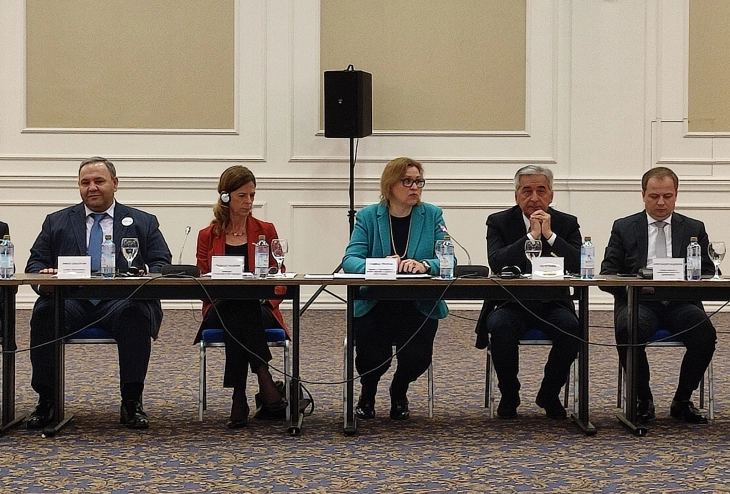Grkovska: Digitization not progressing equally in all institutions and municipalities
- We are aware that progress in the field isn’t equal, some institutions are way ahead of others when it comes to using new technologies in order to improve their work. Which is why we need a strategic and comprehensive approach to move forward and modernize all parts of the system, and this is the only way we can fulfill our goal, said Deputy Prime Minister in charge of good governance policies Slavica Grkovska in her address Wednesday at the “From Paper to Pixels: Digital Transformation of the Municipalities” conference organized by the UNDP.
- Post By Angel Dimoski
- 14:29, 10 May, 2023

Skopje, 10 May 2023 (MIA) – We are aware that progress in the field isn’t equal, some institutions are way ahead of others when it comes to using new technologies in order to improve their work. Which is why we need a strategic and comprehensive approach to move forward and modernize all parts of the system, and this is the only way we can fulfill our goal, said Deputy Prime Minister in charge of good governance policies Slavica Grkovska in her address Wednesday at the “From Paper to Pixels: Digital Transformation of the Municipalities” conference organized by the UNDP.
At the conference focused on challenges related to the digital transformation of the municipalities in the country, Grkovska said that the National Council for Digital Transformation of Society, which she chairs, recently adopted the concept for digital transformation of society, and currently a roadmap of activities is being drafted which will define the basic principles leading the digital transformation in all areas of society

“Considering the scope of these changes it is clear that the process cannot be in the hands of a single stakeholder, and it must unfold in cooperation between the Government, public institutions, private and civil sector, as well as the academic community,” said Grkovska.
The Deputy PM also touched upon the risks of digitization related to cybersecurity and the use of digital services.
“The security of our personal information and cybersecurity in general are issues which we should prioritize in this process because we have the obligation to make the citizens feel secure when using digital tools and assure them that their personal information will not be threatened during this process. Otherwise, we might end up in a situation in which not only are the advantages of digitization threatened, but are also lesser than the damages caused by the hybrid threats that are a part of our new reality,” the Deputy PM underlined.
In his address, Minister of Local Self-Government Risto Penov said that the public sector is slow to adapt to the changes because they are conditioned by internal preparedness, as well as technical and human resources, and the readiness of the citizens to accept the new conditions and use the new digital tools.

“At this stage we need a more systemic approach, and instead of going from municipality to municipality, we need to focus on services. In that way the services would be equal in all municipalities, and the expenses could be shared by all municipalities through the procurement of shared equipment. Apart from efficiency, the goal of digitizing services is reducing the room for corruption and increasing transparency and accountability,” said Penov.
The Deputy Minister of Information Society and Administration, Aleksandar Bajdevski, said that digitization and cybersecurity are some of the main strategic priorities of the Government, and that the Ministry of Information Society and Administration is actively working in that field. Bajdevski added that the Ministry has advanced ICT systems which are available to all institutions in the country, regardless if they are a part of the central or local government.

The Swiss Ambassador to North Macedonia, Véronique Hulmann, said that the digital transformation of public administration is a priority of the Government supported by several international development partners, while the promotion of digital transformation on a municipal level has emerged as a new focus of the Ministry of Local Self-Government and the international partners working to improve the local self-government and the decentralization.
According to Hulmann, digital technology must protect human rights and democracy, and must not increase social risks or introduce control over society.

The UNDP Resident Representative to North Macedonia, Armen Grigoriyan, said that the digital transformation should not be seen only as a trendy process, but should be seen as a contribution to better, more sustainable and more efficient public services for the citizens.
Photo: MIA/UNDP







